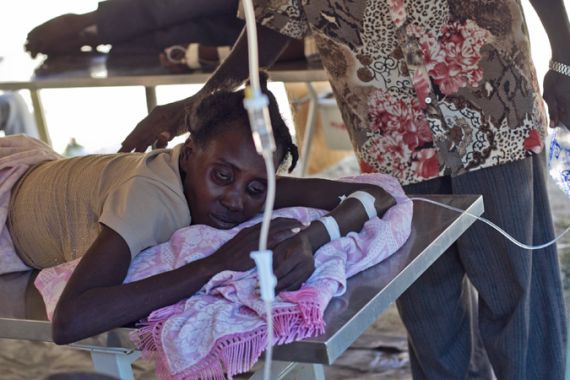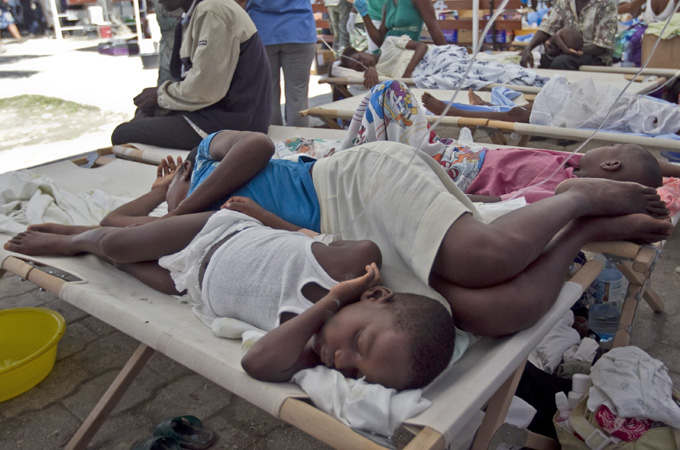UN troops blamed for Haiti cholera
Nepalese peacekeepers accused by some of bringing disease as Tropical Storm Tomas heads towards country.

 |
| More than 4,700 people have been hospitalised due to an outbreak of cholera [Reuters/Minustah] |
Hundreds of Haitians have demanded that a group of Nepalese peacekeepers leave the country, blaming them for a cholera outbreak that has killed at least 330 people and left nearly 5,000 others infected.
The demonstrators waved tree branches and anti-UN banners as they walked on Friday from the central plateau city of Mirebalais to the gates of the UN base near a tributary of the Artibonite River, which has been identified by health officials as being contaminated.
Keep reading
list of 4 itemsLost Futures
Photos: Greek valley that became a lake stirs drought debate
Botswana threatens to send 20,000 elephants to Germany
They chanted “Like it or not, they must go” as the Nepalese soldiers and other UN peacekeepers remained inside.
Al Jazeera’s Sebastian Walker, reporting from Port-au-Prince, said there had be no confirmation of the accusations that excrement from the newly arrived unit of UN peacekeepers from Nepal caused the epidemic.
“We certainly saw a lot of activity there when we visited the base recently, with UN soldiers digging around the latrines, trying to stop what looked like sewage from seeping down into the river,” he said.
“But we are not sure this could be a source of contamination. The UN has been very certain in denying that.”
Rising anger
Cholera is endemic in Nepal and the country suffered outbreaks this summer. The troops arrived in shifts starting on October 9, after the outbreak in their home country and shortly before the disease broke out in Haiti.
The UN mission says no cases of cholera have been found among the Nepalese soldiers, but the denials have not been sufficient to address the rising anger over the spread of the disease, which causes severe dehydration, diarrhoea and vomiting.
“The Nepalese brought this disease to the centre of Mirebalais,” Ernst Exilume, a 25-year-old student, said. “We have no water to drink. We have no choice but to drink the water from the river.”
Clinics have been operating beyond capacity around the Artibonite River, which is carrying the deadly cholera bacteria across the country to the Caribbean coast at Saint Marc, the outbreak’s epicentre, about 100km north of Port-au-Prince.
However, Claire-Lise Chaignat, the head of the World Health Organisation’s cholera task force, said any speculation about the source of the outbreak was “premature”.
“The speculation about the UN troops from Nepal having brought the disease to Haiti seems very unlikely,” she told Al Jazeera.
“The way for the troops to be transported from Nepal to Haiti is long enough that the disease would have declared itself before they reached Haiti.
“We also know that troops and armies normally live in good sanitary conditions and are not exposed to conditions which are conducive to getting cholera.”
Hurricane warning
Meanwhile, there were increasing fears that the cholera outbreak could have reached the capital, Port-au-Prince, where hundreds of thousands of people are living in makeshift camps following an earthquake in January.
Those concerns have been amplified by news of a tropical storm heading towards Haiti from the eastern coast of Trinidad. Forecasters have said it could turn into a hurricane in the coming days.
“A storm is the worst possible scenario for authorities trying to contain the cholera emergency,” Al Jazeera’s Walker said.
Tropical Storm Tomas, it is said, could hit the southern Haiti as early as on Sunday, worsening the situation in the country.
International aid group Save the Children warned that cholera could “spread like wildfire” if it reached the hundreds of temporary camps in and around the capital.
“News of cases closer to the capital is chilling. Mothers are scared, asking what they can do,” Ribka Amsalu, the group’s emergency health adviser in Haiti, warned in a statement.
The group described sanitation conditions in the camps as “dire, with homes surrounded by rubbish and people having to cook, clean and wash in the same place”.